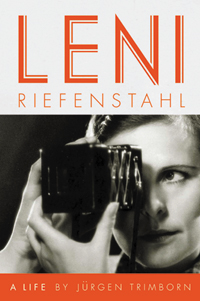(Faber & Faber, 368 pages, $35)
By Jurgen Trimborn (translated by Edna McCown)
 Toward the end of her long and controversial life (she died at age 101 in 2003), German director Leni Riefenstahl, forever infamous as “Hitler’s filmmaker,” began to earn some grudging respect - if only for her longevity. Her self-serving, monotonous 1987 autobiography and the lengthy 1993 documentary The Wonderful, Horrible Life of Leni Riefenstahl made some progress toward granting her a belated rehabilitation, much of it based on her two most famous works, Triumph of the Will and Olympia. This did not sit well with German film historian Jurgen Trimborn, an authority on Third Reich cinema. He felt a revised, balanced look at the well-documented facts and the bald lies that Riefenstahl had long-peddled about her work was needed. Many of her false claims had gained wider traction through incessant repetition. So in 1997, Trimborn approached her in good faith but found her imperious, stubborn and largely unapologetic. He shut off contact and embarked on his own biography. The result is a long overdue consideration of whether Riefenstahl’s artistry can ever be separated from the moral stain of her relationship with Hitler. All things considered, Trimborn finds that it cannot. He rehashes her many egregious deeds: credit theft (erasing a Jewish collaborator’s name from one prewar feature, then setting the Nazi race law authorities on him); abject denial (she witnessed a 1939 massacre in Poland, yet her ardor for Hitler remained undiminished); use of forced labor (including gypsies who later died in Auschwitz), and sheer mendacity before the postwar de-Nazification tribunals. Although Trimborn commends her energy, her technical inventiveness and her undeniably stunning cinematography, especially in the supposedly apolitical Olympia, he finds all of this is outweighed by her grotesque self-absorption, self-pity and moral myopia. Admirably well-sourced, consistently evenhanded, and remarkably succinct at 368 pages, this is now the authoritative biography of an appalling, albeit fascinating figure of cinema.
Toward the end of her long and controversial life (she died at age 101 in 2003), German director Leni Riefenstahl, forever infamous as “Hitler’s filmmaker,” began to earn some grudging respect - if only for her longevity. Her self-serving, monotonous 1987 autobiography and the lengthy 1993 documentary The Wonderful, Horrible Life of Leni Riefenstahl made some progress toward granting her a belated rehabilitation, much of it based on her two most famous works, Triumph of the Will and Olympia. This did not sit well with German film historian Jurgen Trimborn, an authority on Third Reich cinema. He felt a revised, balanced look at the well-documented facts and the bald lies that Riefenstahl had long-peddled about her work was needed. Many of her false claims had gained wider traction through incessant repetition. So in 1997, Trimborn approached her in good faith but found her imperious, stubborn and largely unapologetic. He shut off contact and embarked on his own biography. The result is a long overdue consideration of whether Riefenstahl’s artistry can ever be separated from the moral stain of her relationship with Hitler. All things considered, Trimborn finds that it cannot. He rehashes her many egregious deeds: credit theft (erasing a Jewish collaborator’s name from one prewar feature, then setting the Nazi race law authorities on him); abject denial (she witnessed a 1939 massacre in Poland, yet her ardor for Hitler remained undiminished); use of forced labor (including gypsies who later died in Auschwitz), and sheer mendacity before the postwar de-Nazification tribunals. Although Trimborn commends her energy, her technical inventiveness and her undeniably stunning cinematography, especially in the supposedly apolitical Olympia, he finds all of this is outweighed by her grotesque self-absorption, self-pity and moral myopia. Admirably well-sourced, consistently evenhanded, and remarkably succinct at 368 pages, this is now the authoritative biography of an appalling, albeit fascinating figure of cinema.
Review written by John Patterson.